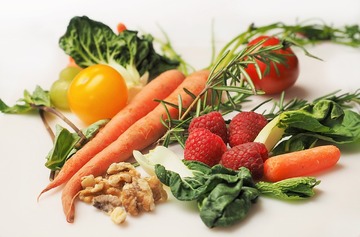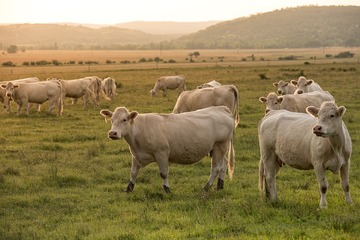
Halal is not the same as Kosher or Organic, but there are similarities between Kosher and Halal, and food and cosmetics that are certified Halal may also be certified Organic.
The concepts of halal and kosher are both rooted in scriptural passages relating to what Muslims and Jews, respectively, may eat. Halal regulations are based on the Quran, the Muslim holy book, whereas kosher regulations are based on the Torah, the Jewish holy book. Just as halal means permissible and fit for consumption, entailing purity and goodness, kosher means “pure” or “fit for consumption.” Like halal, kosher rules limit which animals can be eaten – cattle, sheep, goats, and poultry, for example, are allowed by both, while pork, blood, and the meat of carnivorous animals are prohibited. Nearly all clean, whole, plant-based foods such as grains, fruits, vegetables, nuts, and seeds, would be considered kosher and halal. Kosher and halal are also similar in that they require ritual slaughter of animals by a person of faith in such a way that the animal does not experience pain and is rendered unconscious in seconds

Though they have similarities, Halal and Kosher regulations do differ. Camel and shellfish can be Halal but are not Kosher, and Kosher foods may not combine meat and milk. Alcohol is not permissible in Muslim dietary laws but is allowed in the Jewish tradition. Kosher baked goods made with alcohol-based vanilla extract, for example, would not be Halal. Thus, while many Kosher foods would be permissible to Muslims, products need to be certified Halal for consumers to have complete confidence that they meet Islamic dietary standards.

Much like the certification process for halal foods necessitated by industrially processed food and global trade, there is a process for kosher certification overseen by religious authorities that confers upon food processors the right to display a kosher seal. Thus, there are many similarities between kosher and halal, but since the regulations do differ somewhat, foods that need to be certified – especially meat - will generally be certified as either kosher or halal but not both.
In contrast to halal and kosher certification, organic certification is based entirely on crop and livestock management practices and food processing does not have any religious basis. Organic certification offers consumers a guarantee that certified food and cosmetics were produced without synthetic ingredients or inputs. Animal products, crops, processed foods, and cosmetics can be certified organic. For animal products, organic certification means that they were raised without antibiotics or hormones and fed organic feed. There are other requirements too – for example, organic cattle must be at least partially grass fed. Organic crops must be raised without synthetic fertilizers or pesticides, and farmers must employ practices designed to protect soil and water health such as crop rotation and cover cropping. Organic cosmetics and processed foods must be made with at least 95% organic ingredients and cannot contain artificial colors, flavors, or preservatives.

In the US, the Department of Agriculture sets organic standards and USDA-accredited third party organizations, such as Quality Assurance International or certain state and county agriculture departments, certify that a farmer or processor has followed them. Then, those products can be sold as organic and can display the highly recognizable USDA Organic seal. It is difficult to become organically certified, as the process involves following strict standards, a lot of paperwork, and inspections by certifying agents.
Many foods could be certified halal and organic, but neither means that the other is necessarily true. Certain products that can be certified organic, such as pork, blood sausage, or wine, could not be certified halal, and certified halal products that contain artificial flavors or colors could not be certified organic. In general, however, halal certification indicates a high standard of purity and careful attention to proper slaughter and handling procedures, addressing many of the same concerns that draw consumers to organic products.
